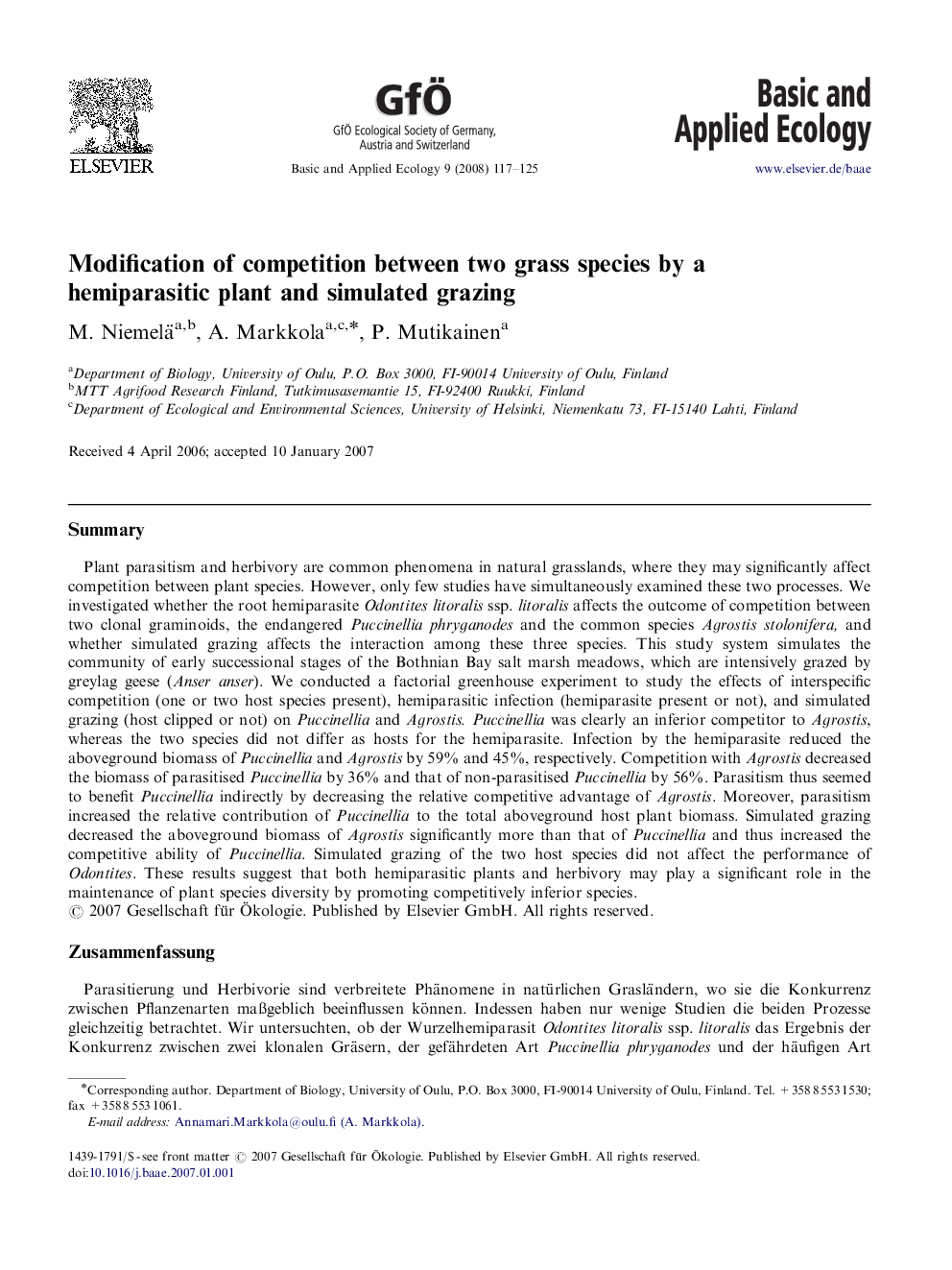| کد مقاله | کد نشریه | سال انتشار | مقاله انگلیسی | نسخه تمام متن |
|---|---|---|---|---|
| 4384812 | 1304437 | 2008 | 9 صفحه PDF | دانلود رایگان |

SummaryPlant parasitism and herbivory are common phenomena in natural grasslands, where they may significantly affect competition between plant species. However, only few studies have simultaneously examined these two processes. We investigated whether the root hemiparasite Odontites litoralis ssp. litoralis affects the outcome of competition between two clonal graminoids, the endangered Puccinellia phryganodes and the common species Agrostis stolonifera, and whether simulated grazing affects the interaction among these three species. This study system simulates the community of early successional stages of the Bothnian Bay salt marsh meadows, which are intensively grazed by greylag geese (Anser anser). We conducted a factorial greenhouse experiment to study the effects of interspecific competition (one or two host species present), hemiparasitic infection (hemiparasite present or not), and simulated grazing (host clipped or not) on Puccinellia and Agrostis. Puccinellia was clearly an inferior competitor to Agrostis, whereas the two species did not differ as hosts for the hemiparasite. Infection by the hemiparasite reduced the aboveground biomass of Puccinellia and Agrostis by 59% and 45%, respectively. Competition with Agrostis decreased the biomass of parasitised Puccinellia by 36% and that of non-parasitised Puccinellia by 56%. Parasitism thus seemed to benefit Puccinellia indirectly by decreasing the relative competitive advantage of Agrostis. Moreover, parasitism increased the relative contribution of Puccinellia to the total aboveground host plant biomass. Simulated grazing decreased the aboveground biomass of Agrostis significantly more than that of Puccinellia and thus increased the competitive ability of Puccinellia. Simulated grazing of the two host species did not affect the performance of Odontites. These results suggest that both hemiparasitic plants and herbivory may play a significant role in the maintenance of plant species diversity by promoting competitively inferior species.
ZusammenfassungParasitierung und Herbivorie sind verbreitete Phänomene in natürlichen Grasländern, wo sie die Konkurrenz zwischen Pflanzenarten maßgeblich beeinflussen können. Indessen haben nur wenige Studien die beiden Prozesse gleichzeitig betrachtet. Wir untersuchten, ob der Wurzelhemiparasit Odontites litoralis ssp. litoralis das Ergebnis der Konkurrenz zwischen zwei klonalen Gräsern, der gefährdeten Art Puccinellia phryganodes und der häufigen Art Agrostis stolonifera, beeinflusst und ob sich simulierte Beweidung auf die Interaktionen zwischen den drei Arten auswirkt. Das untersuchte System bildet die Gemeinschaft der frühen Sukzessionsstadien der Salzwiesen im nördlichen Teil des Bottnischen Meerbusens nach, die intensiv von Graugänsen (Anser anser) beweidet werden. In einem faktoriellen Gewächshausexperiment untersuchten wir die Effekte von interspezifischer Konkurrenz (eine oder beide Wirtsarten vorhanden), des Befalls mit dem Hemiparasiten (Hemiparasit vorhanden oder nicht), und von simulierter Beweidung (Wirtspflanzen beschnitten oder nicht) auf die beiden Gräser. Puccinellia war Agrostis als Konkurrent eindeutig unterlegen, während beide Arten sich als Wirte für den Hemiparasiten nicht unterschieden. Befall durch den Hemiparasiten reduzierte die oberirdische Biomasse von Puccinellia und Agrostis um 59 bzw. 45%. Konkurrenz mit Agrostis verminderte die Biomasse parasitierter Puccinellia um 36% und die von nicht parasitierter Puccinellia um 56%. Parasitierung schien deshalb Puccinellia indirekt zu begünstigen, indem der relative Konkurrenzvorteil von Agrostis reduziert wurde. Außerdem erhöhte die Parasitierung den relativen Beitrag von Puccinellia zur oberirdischen Gesamt-Pflanzenbiomasse. Simulierte Beweidung verringerte die oberirdische Biomasse von Agrostis signifikant stärker als die von Puccinellia und stärkte somit die Konkurrenzkraft der zweiten Art. Die simulierte Beweidung der Wirtsarten beeinflusste die Performanz von Odontites nicht. Diese Ergebnisse legen nahe, daß sowohl hemiparasitische Pflanzen als auch Beweidung eine wichtige Rolle bei der Erhaltung der Artenvielfalt der Pflanzen spielen können, indem unterlegene Konkurrenten gefördert werden.
Journal: Basic and Applied Ecology - Volume 9, Issue 2, 10 March 2008, Pages 117–125